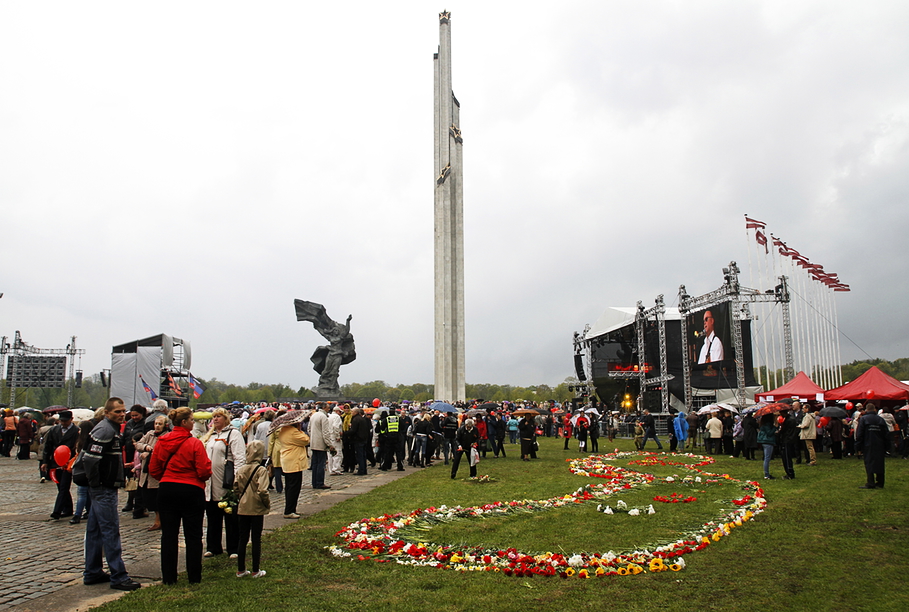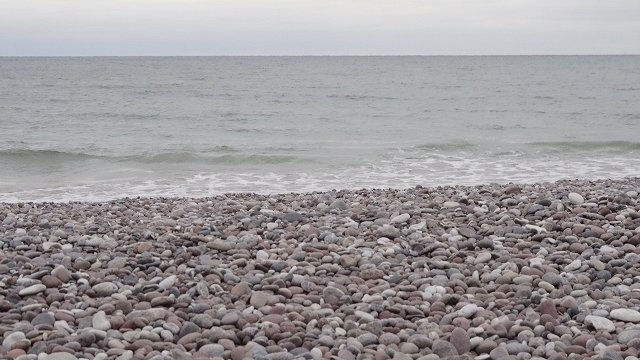What would they do without each other, these two dates on which certain parts of the population can feel so entirely right and know certain other parts are so entirely wrong? March 16 and May 9 chase each other across the springtime calendar like frolicking lambs, one with SS thunderflashes painted on its haunches, the other with a red star.
There are plenty of accounts of the background to May 9 and March 16, none better than this one by Atis Lejins, now a Saeima deputy. The official government line is given here.
The basic order of play on May 9 goes something like this: elderly veterans mainly but not exclusively from Latvia's Russian minority celebrate by laying flowers at the ugly Victory Monument in Victory Park (originally named after another Victory entirely).
Some of the veterans proudly display their medals – as likely to have been awarded by the kolkhoz as the military – taking advantage of the one day in the year when they know they won't be arrested for doing so.
Around these remnants of the war, various things swirl: parents trying to negotiate the vast mass of humanity without losing their children, harassed-looking workers who've battled through the heaving trams to lay a flower during their lunch break and then immediately have to turn around and retrace their steps, hundreds of Russian flags, tracksuits, St George ribbons, cars hooting their horns and red flowers, yellow flowers, red flowers.
There are clownish elements too, adding to the circus atmosphere: the huge hat of the Belarusian military attache demanding an egg be fried on it in the May sunshine, the pasty young radicals decked out in plashpalatkas with lipstick and jewelry, the smell of shashlik cooked too quick, the unique stench of pro-Moscow politician Jacob Pliner's cigarettes as he chain-smokes on the sidelines, matronly babushkas starting to sing a wartime melody in operatic falsetto only to be drowned out by a burst of over-amplified Russo-rock from the stage.
Yes, there are a few people who've overdone it on the vodka and are staggering around haphazardly. It's hard to tell whether they do it because on this particular day they feel so powerful or because they feel so inadequate. But it's not the squalid booze-fest some opponents like to caricature it as. The drunks are generally told their presence is not welcome by other attendees long before the police get involved.
And they are not the only ones told to clear off. One of the highlights of recent years came courtesy of Vladimir Linderman, Latvia's resident Red Revolutionary, a figure who seems to have fallen straight from the pages of a discarded Joseph Conrad novel.
With the conflict in Ukraine picking up momentum he saw an opportunity for provocation and marched towards the monument on his spidery legs waving the red, blue and black flag of the newly-proclaimed 'Donetsk People's Republic'.
Looking very pleased with himself, he awaited a standing ovation only to have his way blocked by a furious old woman.
“How dare you!” she screamed in his face. “How dare you bring here a Russian flag with black instead of white!”
Linderman beat a hasty retreat. The toughs around him had been ready for a game of push-me, pull-you with the police but were at a loss when it came to a vengeful pensioner. Lurking on the sidelines still, Pliners lit a cigarette, looking relieved he hadn't stood close enough to be associated with the debacle.
It is Linderman, Pliners and their kind, who treat May 9 as an ideological opportunity rather than an act of personal commemoration that are the main problem, just as the ideologues arguing that there was a “good” Waffen-SS are the main problem with March 16.
There's nothing wrong with families wanting to remember an uncle or a grandfather who fought in the war. Roughly equal numbers of Latvians fought on both sides, not having the opportunity to choose their own side.
Terrible atrocities happened. But not everyone in the Red Army was a rapist, just as not everyone in the Latvian Legion was a genocidal maniac.
Most soldiers – in all armies in all wars throughout history – don't want to be on the battlefield. They would rather be at home minding their own business. The majority just want to be 'Uncle' or maybe one day 'Granddad', after doing what they were told or what they thought might be right. None know how history will judge them. The brutal komissars and the psychopaths addicted to death are the exception, not the rule.
This does nothing to alleviate the suffering of those who were raped and slaughtered. It does not mean they or their families should approve of March 16 or May 9. But it does mean that if Latvia is prepared to tolerate - tolerate, not approve of - such events, it has some real claim to be a pluralistic democracy that is mature enough to cope with the uncomfortable consequences of its own history.
My enduring memory of Victory Day was watching a young couple push their little daughter towards a very old lady wearing a faded air force uniform complete with a vast row of freshly-polished medals even more voluminous than the forgotten admirals and generals walking by.
“Give her a flower and ask her what she did in the war!” whispered the father. He spoke Latvian.
The girl stepped forward nervously.
“Please,” she said, holding out a red tulip, “what did you do in the war?”
“I flew planes,” said the old woman, “Thank you for the flower, you are a very pretty girl.”
Father wanted more.
“She flew planes! It must have been wonderful to fight and win the victory, ask her how it felt!” he urged.
The old woman placed her hand on the little girl's shoulder and stooped down to look her in the eye.
“It was a terrible thing to drop bombs on your own homeland, a terrible thing. Please, make sure you never have another war. That is the most important thing to remember. Never have a war.”






























